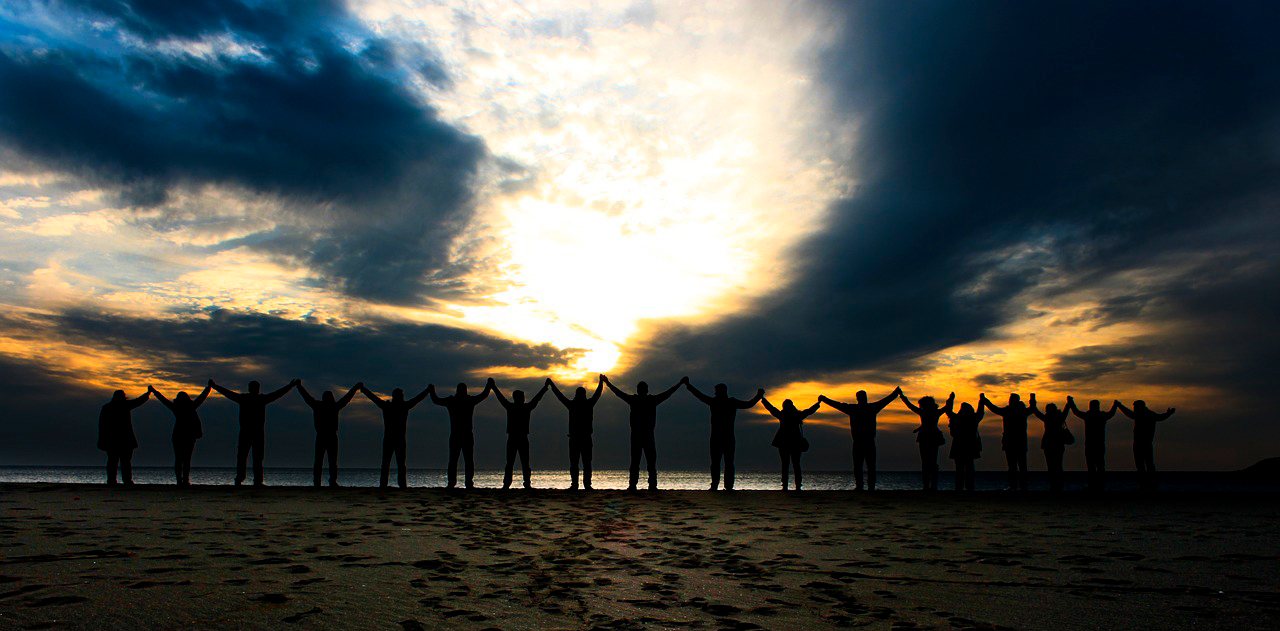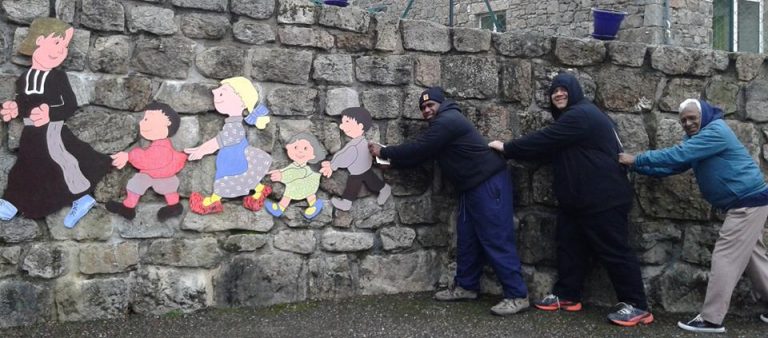
A reflexion for lent: Like Marcellin, let’s be talented in human relationships
Br. Ben Consigli
As we begin this Lent, I want to share with you some insights from Father Ronald Rolheiser’s book, Sacred Fire: A Vision for a Deeper Human and Christian Maturity. A few years ago, I had used this book as part of my annual retreat in the foothills of the Tucson Mountains and the beautiful Sonoran Desert in the US state of Arizona. The desert is a dry, dusty, desolate place, but it can offer a place for inner reflection and contemplation to encounter our relationship with God. The desert can be a setting for deepened, renewed inner life, but it can as easily be life-threatening. The desert demands decisions, choices, and we have to make the right ones or our lives are in danger. In the desert we are stripped down to essentials. It is a place where we cannot hide from our own selves. According to our Church Fathers and Mothers, the desert is also the place of the greatest closeness to God.The desert in this biblical and spiritual sense is never a place to stay. It is a situation to go through…you journey on and out. Lent, in some ways, is like a desert—filled with “dust and ashes.” It is fitting then that our annual Lenten journey with God begins with Ash Wednesday.
Lent can be for each of us a time where we make a greater effort to be led by God. Lent invites us into the desert to examine our own lives and calls us to come back to God:
“But now– declares Yahweh — come back to me with all your heart, fasting, weeping, mourning. Tear your hearts and not your clothes, and come back to Yahweh your God, for he is gracious and compassionate, slow to anger, rich in faithful love, and he relents about inflicting disaster.” (Joel 2: 12-13)
As I reflect on those retreat times, I realize that the desert always has had so much to teach me. It calls me to simplify my life—both the material aspects of it as well as my spirituality. I have come to realize more deeply what Rolheiser calls “the three phrases” that should be in our personal spiritual vocabulary: Thank you! Thank you! Thank you! At times, however, we all can find it difficult to be grateful.
Yet, it is from this stance of gratitude for all that our God has gifted us that Rolheiser offers ten ways to simplify our spiritual lives. Here they are in his own words. I continue to find them helpful—and challenging–in my own spiritual journey:
- Live in gratitude and thank your Creator by enjoying your life. “The real task of life…is to recognize this, to recognize that everything is a gift and that we need to keep saying thanks over and over again for all the things in life that we so much take for granted, recognizing always that it is nobody’s job to take care of us….Our level of maturity and generativity is synonymous with our level of gratitude—and mature people enjoy their lives.” and see all that they have been given as gift, not entitlement.
- Be willing to carry more and more of life’s complexities with empathy. “We are mature to the degree that our own restlessness is no longer the center of our lives.” The world does not revolve around us, but around all of us.
- Transform jealousy, anger, bitterness, and hatred rather than give them back in kind. “Look to Mary in the Gospels, she is a paradigm for this as she ponders; i.e., she can hold and carry tension rather than give it back in kind.” According to Rolheiser, in essence, what Mary was doing under the cross was this: “She couldn’t stop the crucifixion (there are times when darkness has its hour) but she could stop some of the hatred, bitterness, jealousy, heartlessness, and anger that caused it and surrounded it. And she helped stop bitterness by refusing to give it back in kind, by transforming rather than transmitting it, by swallowing hard and (literally) eating bitterness rather than giving it back, as everyone else was doing.” How do I transform jealousy, anger, bitterness?? Possibly through prayer, honest dialogue, and accompaniment with another.
- Let suffering soften your heart rather than harden your soul. On the cross, “Jesus’ choice was this: Do I die in bitterness or in love? Do I die in hardness of heart or softness of soul? Do I die in resentment or in forgiveness? …We know which way he chose. His humiliation drove him to deep depths, but these were depths of empathy, love, and forgiveness…In the face of our earthly diminishment and death, will we choose to let go and die with a cold heart or a warm soul?”
- Forgive—those who hurt you, your own sins, the unfairness of your life, and God for not rescuing you. “Perhaps true forgiveness can only be divine in origin, the operation of a special grace inside us…There is only one moral imperative before we die: not to die an angry, bitter person.”
- Bless more and curse less! “We are mature when we define ourselves by what we stand for rather than what we stand against…. the crowning glory of maturity and discipleship is the capacity and willingness to bless others, particularly the young.”
- Live in a more radical sobriety. “Maturity does not mean we are perfect or faultless, but that we are honest…Sobriety is ultimately not about alcohol or some drug. It is about honesty and transparency.”
- Pray, affectively and liturgically. “The fuel we need to resource ourselves for our journey in life does not lie in the strength of our own willpower, but in grace and community…Maturity and generativity cannot be sustained by willpower alone. We need help from beyond, and that help is found in prayer.” This “help from beyond” can also found in times of retreat, through spiritual accompaniment, and through those who can offer us professional psychological support and guidance.
- Be wide in your embrace. “A true catholic heart has room for everyone.”
- Stand where you are supposed to be standing, and let God provide the rest. “We can only do our best, whatever our place in life, wherever we stand, whatever our limits, whatever our shortcomings, and trust that this is enough, that if we die at our post, honest, doing our duty, God will do the rest.”
In many ways, this was the spiritual journey that Marcellin lived.

Gratitude filled his life. In some of his correspondence and through the reminiscences of those who knew him well, we see Marcellin as calm, serene, open, constant, prayerful, and courageous. Aware of his own limitations, he was gifted with a deep intelligence in the practical sense, and he was exceedingly confident in his convictions. Marcellin always hoped that the quality which would define his “Little Brothers of Mary” would be simplicity, and in many ways, this quality characterized Marcellin. For Marcellin, simplicity was straightforwardness in relationships with others, enthusiasm for the work at hand, and an uncomplicated confidence in Mary and in his God. He shared this quality with his Brothers whom he hoped would become like a family—and for a family to thrive, forgiveness was a hallmark which he left to his Brothers: “Let it be said of the Little Brothers of Mary as it was said of the first Christians: ‘See how they love one another.’”
Because of his simplicity, Marcellin was truly talented in human relationships; He was always willing to carry more and more of life’s complexities with empathy, especially while helping to form his Brothers. His common sense and his compassion made him a popular confessor throughout his life. He was able to communicate effectively and empathize easily with others. Yet we know from our Marist history that Marcellin was not a man for writing spiritual treatises, but he was a man of determination and action, a man of heart and affection. His emphasis was on the heart and on relationships – both with God and other people. It was, and is, key to our spiritual heritage and to our Marist pedagogy. It was through this heart and affection…for the youth of rural France and for those who would teach them…that Marcellin succeeded in doing what many thought impossible. These qualities of Marcellin— “his open, friendly and considerate character…his unassuming affability, a straightforwardness and impression of kindness”—allowed him to do great things and live a life that was simple, joy-filled, and focused on the Gospel of Jesus.
Christians have used the season of penitence we call Lent to prepare for Jesus’ suffering, death, and resurrection at Easter. During Lent it is traditional to fast, pray, and practice self-denial. But keeping Lent also involves taking up things that help us focus on God, in other words, taking up those things we can “feast upon”. American author, teacher, and pastor, William Arthur Ward offered the following:
Fast From-Feast On
- Fast from judging others; Feast on the Christ dwelling in them.
- Fast from emphasis on differences; Feast on the unity of life.
- Fast from apparent darkness; Feast on the reality of light.
- Fast from thoughts of illness; Feast on the healing power of God.
- Fast from words that pollute; Feast on phrases that purify.
- Fast from discontent; Feast on gratitude.
- Fast from anger; Feast on patience.
- Fast from pessimism; Feast on optimism.
- Fast from worry; Feast on divine order.
- Fast from complaining; Feast on appreciation.
- Fast from negatives; Feast on affirmatives.
- Fast from unrelenting pressures; Feast on unceasing prayer.
- Fast from hostility; Feast on non-resistance.
- Fast from bitterness; Feast on forgiveness.
- Fast from self-concern; Feast on compassion for others.
- Fast from personal anxiety; Feast on eternal truth.
- Fast from discouragements; Feast on hope.
- Fast from facts that depress; Feast on verities that uplift.
- Fast from lethargy; Feast on enthusiasm.
- Fast from thoughts that weaken; Feast on promises that inspire.
- Fast from shadows of sorrow; Feast on the sunlight of serenity.
- Fast from idle gossip; Feast on purposeful silence.
- Fast from problems that overwhelm; Feast on prayer that [strengthens].
May this Lent be for us a time to begin again the journey of simplifying our lives so that we can be filled with the love that God has for each of us.
Br. Ben Consigli – General Councilior
General House, Rome – February 2021
